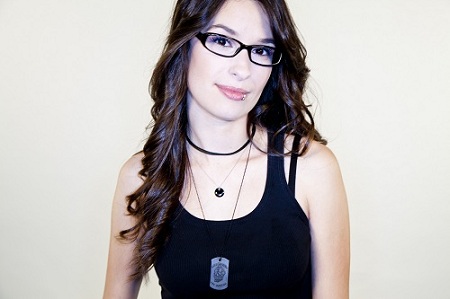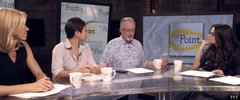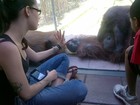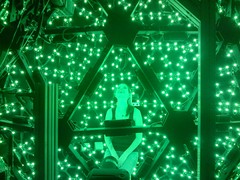
Name Cara Santa Maria
- Education M.S., Biology, Neuroscience Emphasis
- Target Audience Elementary School

Think there's no room for writing skills in science? Cara Santa Maria would disagree with you. This former sciencephobe turned her reading and writing skills into a rewarding science career. Read on to find out why being a science journalist is such a cool job!
Technically, I am the Senior Science Correspondent for The Huffington Post. However, due to the fact that I write, produce and host a video series called "Talk Nerdy to Me", my role here is a bit different than many other science journalists. My job entails a lot of research, doing interviews and writing stories, and I then have to translate these science stories into visual format. I love that I get to bridge the gap between the public and the technical/scientific world. I never say that I dumb things down for the public, because I don't believe the public is dumb. Rather, I find a way to communicate very technical and scientific things in a way that may make more sense to people who don't have a background in those fields.
I didn't initially plan for a career in science journalism. When I decided to pursue a Ph. D. in Clinical Neuropsychology I moved to New York to attend Queens College. After a while I realized that the program I was in, while a great program, was not necessarily for me. At that same time I started dating a boy who lived in Los Angeles, and, long story short, I ended up dropping out of school and moving to LA. Yes, I dropped out of school for a boy. When I got to LA, a number of opportunities presented themselves to me, and I got to take my experience teaching and expand the classroom by working on-air. Eventually, I was offered a position at The Huffington Post.
 I am not a morning person, and I am lucky that my job allows me to work late and sleep late. I usually get into the office around noon and attend to emails and meetings before I turn my attention to production. Then I work with my producer/editor to prepare and film the script I've previously written. After the shoot my focus is to research and write the next piece.
I am not a morning person, and I am lucky that my job allows me to work late and sleep late. I usually get into the office around noon and attend to emails and meetings before I turn my attention to production. Then I work with my producer/editor to prepare and film the script I've previously written. After the shoot my focus is to research and write the next piece.
Most kids think that hosting a show and being in front of a camera is very glamorous, and they think that's all I do. In reality my on-camera time only accounts for about 30 minutes of my day; it's the smallest part of what I do. Most of what I do is research and write.
The most fun and rewarding thing about my job are the relationships I make. I get to interview some amazing people (I got to interview astronauts on the International Space Station in my first month of working here)! And since science communication is communal, I share the common goal of improving science literacy with everyone that I interview. I also love to be able to show the poetic, human side of the sciences.
I was always gifted and talented, but also kind of scared of science. I always thought that science sounded too hard. I leaned more toward the humanities in school; I enjoyed English, writing and singing. Even in college I considered myself more of a literary thinker. It wasn't until I was pursuing psychology, however, that I became fascinated with how the brain worked, and I began to shift my course of study to neuroscience.
I was always a dinosaur nerd, though. I remember digging up my backyard trying to find dinosaur bones. I never really grew out of my love for dinosaurs. You can probably tell by the giant tattoo of Archaeopteryx lithographica that I have on my arm.
No, there wasn't a particular moment. I learned late in college and early in graduate school how to be a student and have a life, as opposed to letting academics and career take over. I also learned to be open to the fact that what I had planned on doing as a kid may not necessarily work out. If you had asked me as a kid what I wanted to do, I was going to be a paleontologist. As I got older I realized that paleontologists don't just get to dig up dinosaur bones all day. They also have to study rocks and dirt. That didn't really interest me at the time, so I adjusted my plans. I learned to roll with the punches and be ok if I didn't get into the "right school" or get the "right job."
 I was always kind of a non-traditional student. At 16 I started college. (I had threatened to drop out of high school because I was bored and unhappy there, so the administrators worked to allow me to attend college and receive high school credit.) Financial challenges were always there, because I never had a lot of money. I was a city and state school kind of girl - I first went to a community college, then to a state school. My education wasn't fully funded, and I had to take out student loans to pay my tuition. While I was a good student, I didn't even bother applying to Ivy League schools like Harvard, Stanford or Cornell because they didn't seem accessible to me.
I was always kind of a non-traditional student. At 16 I started college. (I had threatened to drop out of high school because I was bored and unhappy there, so the administrators worked to allow me to attend college and receive high school credit.) Financial challenges were always there, because I never had a lot of money. I was a city and state school kind of girl - I first went to a community college, then to a state school. My education wasn't fully funded, and I had to take out student loans to pay my tuition. While I was a good student, I didn't even bother applying to Ivy League schools like Harvard, Stanford or Cornell because they didn't seem accessible to me.
Though I had some really great male professors along the way, there were two female professors in particular that stand out to me. One of them was a psychology professor named Dr. Jenkins and the other was a professor of neuroscience named Dr. Pytte. I had a tendency to throw myself into school during my college years, almost in an unhealthy way, and these inspirational women helped me understand how to have a good work/life balance.
I think a lot of kids don't know that they can actually pursue a job in science writing, so the first thing I'd do is tell you it exists! Also, I recommend you read, read, read. Read science literature and don't be afraid if it's a little beyond your level. I used to read National Geographic magazine as a kid and it really captured my imagination. Even if I didn't understand all the words and concepts, the rich illustrations helped me access the science in a meaningful way. Also, whenever you read science writing know that there is a person behind these words - they didn't just come from out of nowhere. Someone had to research the topic and come up with how he/she wanted to present the information.
 One thing that we have been seeing a lot of these past few years is a shift away from print media to the digital sphere. We're developing more and more interactive and creative ways to present information, and who knows what will be possible in the next 10-15 years.
One thing that we have been seeing a lot of these past few years is a shift away from print media to the digital sphere. We're developing more and more interactive and creative ways to present information, and who knows what will be possible in the next 10-15 years.
Without a doubt we need more science communicators. There is more of a need now than ever to improve science literacy, and we need more scientists with social skills who are well rounded and interested in the news and politics and the arts. If you watch Carl Sagan and get goose bumps, we need people like you to help bring an emotional, human voice to STEM!
Archaeopteryx lithographica: An extinct primitive toothed bird of the Jurassic period having a long feathered tail and hollow bones; usually considered the most primitive of all birds.
Neuropsychology: The study of the effects of brain damage on behaviour and the mind.
Paleontology: The science of the forms of life existing in former geologic periods, as represented by their fossils.
STEM: Science, Technology, Engineering and Math.
(as adapted from dictionary.com)
Why did you choose your major? Did you always know this is what you wan…
Lisa Ingham excels on the field and in the classroom as an Engineering …
Why did you choose your major? Did you always know this is what you wan…